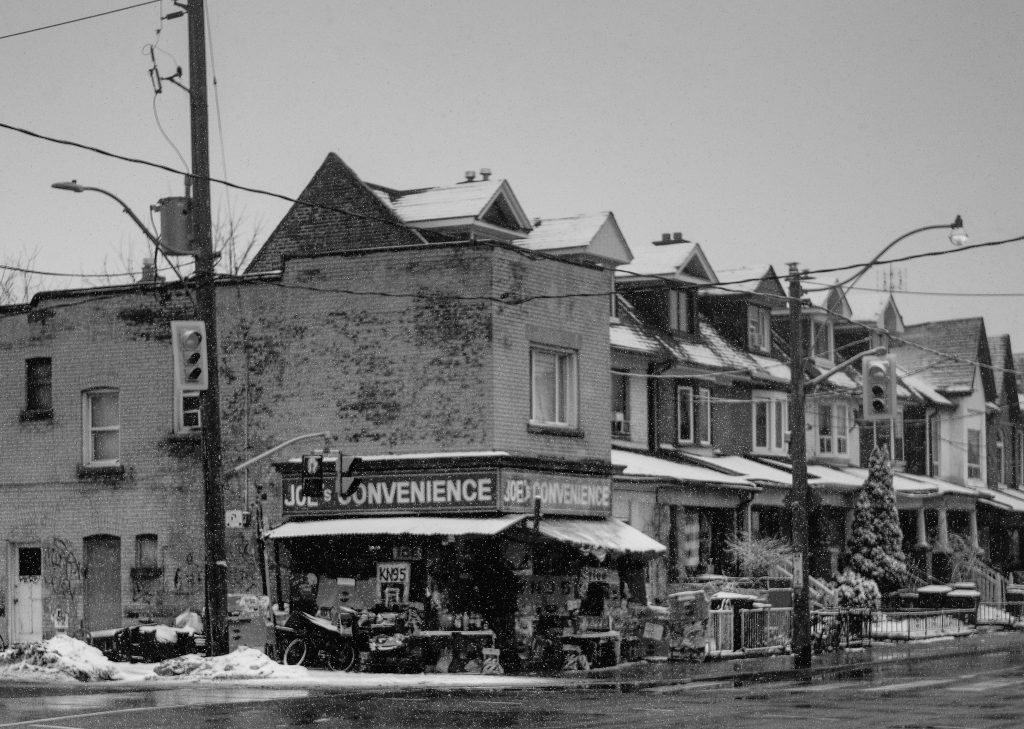In Mudflowers, Aley Waterman honestly and painfully depicts the challenge of finding intimacy in an individualistic culture. At once a tale of friendship and heartbreak, an exploration of grief, and an endearing portrait of the Toronto art scene in the early 2010s, the novel offers an all too relatable story encapsulated by its first line: “I wanted so badly to love in a good way.”
That declaration is made by the protagonist, Sophie, a twenty-seven-year-old stained glass artist from the small coastal town of Corner Brook, Newfoundland and Labrador. Reeling from her mother’s recent death, she moves to Toronto’s west end, where she finds a self-serious roommate, Lionel, and starts having casual sex with her childhood friend Alex, who arrived in the big city a couple of years earlier. Fitting in proves difficult for Sophie, a deep thinker and armchair psychoanalyst who laments that the “city people” around her are engulfed in “a surplus of love and activities.” They are, she tells us, “so good at hiding their hearts, as if the goal wasn’t always to reveal it at some point.”

For the newcomer, a tiny convenience store on Dupont Street captures the city’s essence.
Ilya Yakubovich; Unsplash
Despite her reservations, Sophie gradually settles in, creating colourful mosaics for wealthy clients and bartending to make ends meet. Then she meets a bouncer who threatens her emerging stability: Maggie. A lifelong Torontonian, Maggie is, in many ways, Sophie’s opposite. She’s free-spirited, unbothered by the need to establish herself in the city, and unconcerned with finding a romantic connection. “She seemed to have a force field around her,” Sophie explains. The two begin an intimate relationship, and Sophie falls head over heels. But Maggie never responds to Sophie’s texts, rarely picks up the phone, and regularly ditches their plans. Maggie even admits to having other lovers. “I spent nights unable to sleep in my room, my desire and my grief tangling together,” Sophie recalls. “When I knew I didn’t have access to Maggie, I also felt the acute pain of not being able to reach my mom, not then or ever again.”
When Maggie and Alex run into each other at the bar, a friendship ensues, and the two of them begin hanging out with Sophie at her apartment — drinking, smoking, and bemoaning their empty bank accounts. Eventually, they find out that Sophie has been sleeping with them both: Alex is visibly upset, and Maggie accuses Sophie of using her friend, of callously neglecting him when she —“shiny and new”— came along. “You can’t be close to someone since childhood and then just pawn them off,” Maggie declares. “You can’t just throw him away!”
A few weeks later, Sophie stumbles upon her jilted friends “kissing in a big way,” which confirms her fears that things between them have turned romantic. “Together they were a strange animal and it was hurting me,” she says. “When I closed my eyes, a kaleidoscope of Maggie and Alex kissing presented itself, perfectly symmetrical and spinning, my mind eager to make the image a tidy fiction.” Many readers will feel sorry for the conflicted woman; Waterman ably captures the agony of betrayal, even as Sophie is no innocent bystander. It’s sadly ironic to see the would be psychiatrist, who attempts to analyze and diagnose everyone around her — aiming to pinpoint “something typical” about their personalities — get her closest friends wrong.
For the first half, Mudflowers moves slowly and prioritizes the development of its characters. In this way, Waterman ensures readers will care about them when the fast-paced second half arrives. Sophie takes up an art residency in France. Maggie becomes pregnant with Alex’s child. Alex learns of Maggie’s pregnancy and tells her that, to make them money, he’s “going to B.C. to plant trees.” But Sophie figures he’s actually running back home. “I didn’t have real proof,” she says, “but I could just feel it in my bones.” Without telling Maggie, Sophie returns to Corner Brook to find Alex and convince him to live up to his responsibilities in Toronto.
Upon arrival, Sophie wistfully tries to “see everything through the cozy lens of nostalgia.” Readers are privy to her vivid memories of growing up, which include smoking weed, listening to Radiohead, and creating her first mosaic, which featured “a big rose like the rose in Beauty and the Beast, made with glass from an Ikea mirror that had broken when I had slammed the door once.” (Even the Old Hag, a creature in Newfoundland folklore, makes a haunting appearance.) Ultimately, Sophie comes to terms with the loss of her mother, discovering that the love she longs for might have been present all along in a way that she’d never considered: “between Maggie, Alex, and me.” She realizes that despite the trio’s complicated relationship, “it’s important to stay close to people who love you enough that they will let you be yourself, even in moments of ugliness or unreason.”
Sophie, Maggie, and Alex are believable, likeable characters, even though the liberal, class-conscious side of their “hippie-punk” lifestyle comes across as affected. (The author’s voice is especially obvious in Sophie’s drawn-out musings on books like Jia Tolentino’s Trick Mirror and Dionne Brand’s Theory.) And while the novel’s whirlwind second half is enthralling, it ends rather abruptly. Many readers will be left with unanswered questions. Nonetheless, Mudflowers largely satisfies with an engaging take on familiar themes. Waterman offers a sympathetic portrayal of one woman’s search for love amid loss, across genders, and through periods of incredible change.
Caroline Noël is the magazine’s editorial coordinator.

